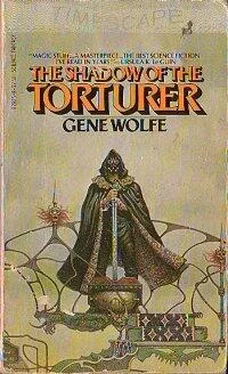Now, going down a narrow and twisted stone stair into a facility a hundredth the size of ours, my feelings were precisely the reverse of what I would have felt there. I was oppressed by the darkness and stench as if by a weight. The thought that I might myself be confined there by some accident (a misunderstood order, for example, or some unsuspected malice on the part of the portreeve) recurred no matter how often I pushed it aside.
I heard the sobbing of a woman, and because the portreeve had spoken of a man, assumed that it came from a cell other than the one that held my client. That, I had been told, was the third from the right. I counted: one, two, and three. The door was merely wood bound with iron, but the locks (such is military efficiency!) had been oiled. Within, the sobbing hesitated and almost ceased as the bolt fell back.
Inside a naked man lay upon straw. A chain ran from the iron collar about his neck to the wall. A woman, naked too, bent over him, her long, brown hair falling past her face and his so that it seemed to unite them. She turned to look at me, and I saw that it was Agia.
She hissed, “Agilus!” and the man sat up. Their faces were so nearly alike that Agia might have been holding a mirror to her own. “It was you,” I said. “But that isn’t possible.” Even while I spoke, I was recalling the way Agia had behaved at the Sanguinary Field, and the strip of black I had seen by the hipparch’s ear.
“You,” Agia said. “Because you lived, he has to die.”
I could only answer, “Is it really Agilus?”
“Of course.” My client’s voice was an octave lower than his twin’s, though less steady. “You still don’t understand, do you?”
I could only shake my bead.
“It was Agia in the shop. In the Septentrion costume. She came in through the rear entrance while I was speaking to you, and I made a sign to her when you wouldn’t even talk of selling the sword.”
Agia said, “I couldn’t speak—you would have known it for a woman’s voice—but the cuirass hid my breasts and the gauntlets my hands. Walking like a man isn’t as hard as men think.”
“Have you ever looked at that sword? The tang should be signed.” Agilus’s hands lifted for a moment, as though he would have taken it still if he could. Agia added in a toneless voice, “It is. By Jovinian. I saw it in the inn.” There was a tiny window high up in the wall behind them and from it, suddenly, as though the ridge of a roof, or a cloud, had now fallen below the sun, a beam of light came to bathe them both. I looked from one aureate face to the other. “You tried to kill me. Just for my sword.”
Agilus said, “I hoped you would leave it—don’t you remember? I tried to persuade you to leave, to flee in disguise. I would have given the clothes to you, and as much money as I could.”
“Severian, don’t you understand? It was worth ten times more than our shop, and the shop was all we had.”
“You’ve done this before. You must have. Everything went too smoothly. A legal murder, with no body to weight for Gyoll.”
“You’re going to kill Agilus, aren’t you? That must be why vou’re here—but you didn’t know it was us until you opened the door. What have we done that you’re not going to do?”
Less stridently her brother’s voice followed Agia’s. “It was a fair combat. We were equally armed, and you agreed to the conditions. Will you give me such a fight tomorrow?”
“You knew that when evening came the warmth of my hands would stimulate the avern, and that it would strike at my face. You wore gloves and you only had to wait. In reality, you didn’t even have to do that, because you had thrown the leaves often be-fore.”
Agilus smiled. “So the business of the gauntlets was a side issue after all.” He spread his hands. “I won. But in reality you won, by some concealed art neither my sister nor I understand. I have been wronged by you three times now, and the old law said that a man three times wronged might claim any boon of his oppressor. I grant that the old law is no longer in force, but my darling tells me you have an attachment to times past, when your guild was great and your fortress the center of the Commonwealth. I claim the boon. Set me free.” Agia rose, brushing the straw from her knees and rounded thighs. As though she realized only now that she was naked, she picked up the blue-green brocade gown I remembered so well and clasped it to her.
I said, “How have I wronged you, Agilus? It seems to me that you have wronged me, or tried to.”
“First by entrapment. You carried an heirloom worth a villa about the city without knowing what it was you had. As owner it was your duty to know, and your ignorance threatens to cost me my life tomorrow unless you free me tonight. Secondly, by refusing to entertain any offer to buy. In our commercial society, one may set one’s price as high as one wishes, but to refuse to sell at any price is treason. Agia and I wore the gaudy armor of a barbarian—you wore his heart. Thirdly, by the sleight with which you won our combat. Unlike you, I found myself contesting powers greater than I could comprehend. I lost my nerve, as any man would, and here I am. I call on you to free me.” Laughter came unwished-for, carrying with it the taste of gall. “You’re asking me to do for you, whom I have every reason to despise, what I wouldn’t do for Thecla, whom I loved almost more than my own life. No. I’m a fool, and if I was not one before, surely your darling sister has made one of me. But not such a fool as that.”
Agia dropped her gown and threw herself toward me with such violence that I thought for an instant she was attacking me. Instead she covered my mouth with kisses, and seizing my hands put one on her breast and the other upon her velvet hip. There were bits of rotten straw there still, and on her back, to which I shifted both hands a moment later.
“Severian, I love you! I longed for you when we were together, and tried to give myself to you a score of times. Don’t you remember the Garden of Delectation? How much I wanted to take you there? It would have been rapture for us both, but you wouldn’t go. For once be honest.” (She spoke as if honesty were an abnormality like mania.) “Don’t you love me? Take me now… here. Agilus will turn his face away, I promise you.” Her fingers had slid between my waistband and my belly, and I was not aware that her other hand had lifted the flap of my sabretache until I heard the rustle of paper there.
I slapped her wrist, perhaps harder than I should, and she flew at me, clawing for my eyes as Thecla used sometimes to do when she could no longer bear the thoughts of imprisonment and pain. I pushed her away—not into a chair this time but against the wall. Her head struck the stone, and though it must have been padded by her abundant hair, the sound was as sharp as the tap of a mason’s hammer. All the strength seemed to leave her knees; she slid down until she was sitting on the straw. I would never have guessed that Agia was capable of weeping, but she wept.
Agilus asked, “What did she do?” There was no emotion beyond curiosity in the question.
“You must have seen her. She tried to reach into my sabretache.” I scooped what coins I possessed out of their compartment: two brass orichalks and seven copper aes. “Or perhaps she wanted to steal the letter I have to the archon of Thrax. I told her about that once, but I don’t carry it in here.”
“She wanted the coins, I am sure. They’ve fed me, but she must be dreadfully hungry.”
I picked Agia up and thrust her torn gown into her arms, then opened the door and led her out. She was still dazed, but when I gave her an orichalk she threw it down and spat at it.
When I reentered the cell, Agilus was sitting cross-legged, his back propped by the wall. “Don’t ask me about Agia,” be said. “Everything you suspect is true—is that enough? I will be dead tomorrow, and she will wed the old man who dotes on her, or someone else. I wanted her to do it sooner. He couldn’t have prevented her from seeing me, her brother. Now I will be gone, and she won’t have even that to worry about.”
Читать дальше










